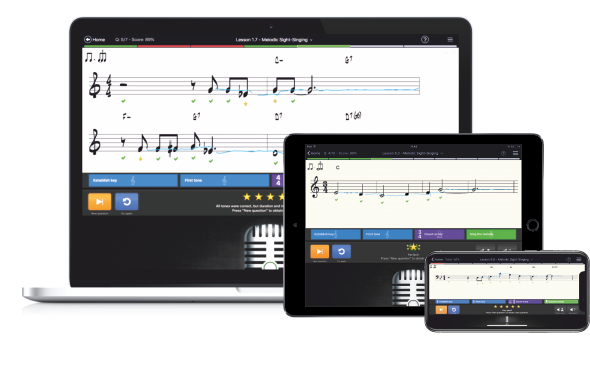What is ear training?
Ear training makes you a better musician
Ear training is the process of connecting music theory with the sounds we hear. This applies to notes, intervals, chords, scales, melodies, rhythms, etc.
We would say that our aural skills are a bridge between the terms that we use to explain music (an octave, a perfect cadence, a harmonic minor scale, etc.), and the actual sounds that those terms describe.
And the more we train our ear to recognize this connection, the better musicians we become. Because we learn to understand what we play, to anticipate musical structures, and to communicate with other musicians using the language of music.
Who needs ear training?
The short answer is: All musicians need ear training! Whether you're a beginner or a professional musician, you need to keep our ear in shape at all times in order to know what you are playing, what other musicians are playing, and how you can interact musically together. This is why ear training is a mandatory course in most music schools and conservatoires around the world.
Is ear training the same as Perfect Pitch?
While Perfect Pitch is often what comes to mind when talking about hearing skills, ear training usually is about improving what we call relative pitch skills, which means that you train to recognize notes in relation to each other. Perfect Pitch, on the contrary, is the rare ability to identify or produce a note without any reference (e.g., hearing a note and knowing it’s a C# instantly).
Even if it can be argued that perfect pitch abilities can be developed through training, in most cases it's an innate ability that some people have naturally. Relative pitch skills, however, can be learned by anyone though ear training, and are absolutely essential for your musical development.
How do you train your aural skills?
The main focus of ear training being the development of aural skills, the training sessions mainly involve identifying sounds by ear and naming them, transcribing them, playing them back, singing them or, at more advanced levels, improvising upon them according to harmonic rules.
In many music schools, ear training includes the use of solfege syllables (movable-Do system), with which you are putting your recognition skills into a tonal context. Singing is also commonly used to improve aural skills, as there is a direct connection between a good musical ear and accurate singing. In most cases, singers can improve their pitch accuracy by simply improving their aural skills.
What does ear training cover?
Ear training usually consists in the study of:
- pitches
- intervals
- chords & harmony
- scales & modes
- rhythm
- keys
- musical attributes (genres, dynamics, intention, etc.)
- singing (from memory or form a score)
- clapping (from memory or from a score)
What are the benefits of practicing ear training?
Training your aural skills is a fundemantal aspect of being a good musician. It's a continuous process that will enable you to:
- Transcribe melodies and chords by ear
- Improve your improvising skills
- Improve your rhythmic skills
- Improve your singing skills
- Improve your intonation
- Improve your ability to tune your instrument
- Improve your musicality
- Interact with other musicians more easily
- Compose music faster
- Sing on pitch
Ear training software and apps - a good idea?
Ear training typically requires two persons to be efficient: one to ask questions, and one to answer them. The feedback you get on how you identify intervals, chords or scales is the key element to your progression. This is where computers come in very handy for ear training. An app never gets tired, an app will be ready to train you any time you want as long as you want. An app will tell you instantly if your answer is right or wrong. An app won't pass judgement on your skills, it will accompany you in your progression.
One of the most efficient ways to train your ear is ear training software and apps like EarMaster.






